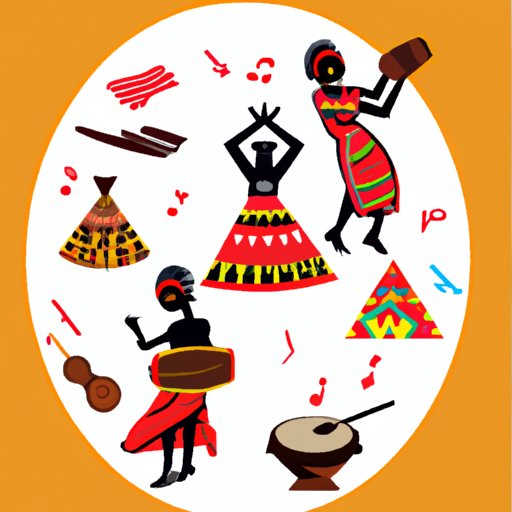Introduction
African culture has been a powerful influence on American culture for centuries. From the days of slavery to the present day, African culture has shaped the identity and character of the United States. This article will explore how African culture has impacted American culture, including music, visual arts, literature, cuisine, and dance forms.
African-American Music Genres
The origins of African-American music genres can be traced back to West Africa. During the period of slavery, African slaves brought with them their own musical traditions, which blended with European music to create an entirely new genre of music. This new genre was characterized by its syncopated rhythms, improvisation, and call-and-response vocals. Examples of African-American music genres include jazz, blues, gospel, hip hop, and R&B.
The influence of African-American music genres on American music is undeniable. Jazz, for example, has been embraced by mainstream American audiences, becoming one of the most popular genres of music in the country. Other African-American genres, such as hip hop, have also achieved mainstream success, influencing the sound of modern American music.
Impact of African Art on American Visual Arts
The history of African art dates back centuries, and it has had a profound impact on American visual arts. African art has influenced everything from abstract expressionism to pop art, as well as modern sculpture and photography. African art is known for its bold colors, intricate patterns, and unique designs, all of which have been adopted and adapted by American artists.
The influence of African art on American visual arts is evident in the works of contemporary artists such as Jean-Michel Basquiat and Kehinde Wiley. Both artists incorporate African motifs into their work, drawing inspiration from traditional African masks, sculptures, and fabrics. Additionally, African-American artists such as Kara Walker and Barkley L. Hendricks have used African-inspired techniques to create powerful and thought-provoking works of art.

Significance of African Proverbs and Folktales in American Literature
African proverbs and folktales are full of wisdom, wit, and insight. They often tell stories about the trials and tribulations of everyday life and impart lessons about morality and ethics. These tales are also rich in symbolism, making them ideal sources of inspiration for American authors.
The themes found in African proverbs and folktales can be seen in the works of American authors such as Langston Hughes, Toni Morrison, and Alice Walker. These authors draw upon African folklore to convey universal truths about humanity and to craft compelling characters and storylines. Additionally, African proverbs and folktales have been used to great effect in American children’s literature, providing entertaining and educational stories for young readers.

Influence of African Cuisine on American Cooking
The history of African cuisine stretches back centuries, and it has had a significant impact on American cooking. African dishes such as jollof rice, plantains, and fufu have become staples of American menus, while African ingredients such as peanuts, okra, and hot peppers are widely used in American recipes. Additionally, African cooking techniques such as smoking and grilling have been adopted by American chefs.
The use of African ingredients and techniques in American cuisine can be seen in the works of renowned chefs such as Marcus Samuelsson and Leah Chase. These chefs have put their own spin on traditional African dishes, creating flavorful and inventive dishes that have become favorites of American diners. Furthermore, African flavors have become increasingly popular in the food industry, with many restaurants offering African-inspired dishes on their menus.

Role of African Dance Styles in American Dance Forms
African dance styles have played an important role in the evolution of American dance forms. From the early days of jazz to the present day, African dance has been an integral part of American culture. African dances such as the Charleston, the Lindy Hop, and the Cakewalk have become iconic American dances, while African-influenced dances such as hip hop and breakdancing have achieved worldwide popularity.
The influence of African dance styles on American dance forms is undeniable. African dances have been adapted and incorporated into virtually every style of American dance, ranging from tap and ballet to Latin and ballroom. Additionally, African dance styles have inspired numerous choreographers, including Alvin Ailey, Katherine Dunham, and George Balanchine.
Conclusion
African culture has had a profound impact on American culture. From music to visual arts, literature, cuisine, and dance forms, African culture has left its mark on nearly every aspect of American culture. African-American music genres, African art, African proverbs and folktales, African cuisine, and African dance styles have all been embraced and adapted by Americans, enriching our cultural landscape.
The influence of African culture on American culture is undeniable, and it is important that we continue to explore and celebrate this rich heritage. By understanding and appreciating African culture, we can gain a deeper appreciation for the diversity of American culture and the richness of our collective history.
(Note: Is this article not meeting your expectations? Do you have knowledge or insights to share? Unlock new opportunities and expand your reach by joining our authors team. Click Registration to join us and share your expertise with our readers.)
